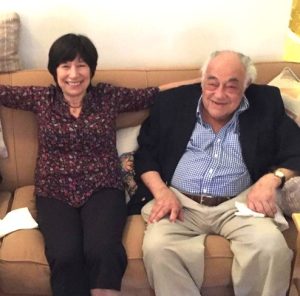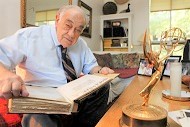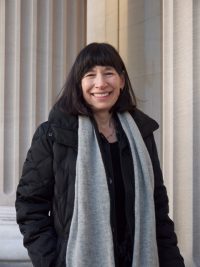[Our regular Old Time Radio Episode will return next week. This week we are privileged to bring you a 25 minute audio documentary by Lauren (Lefferts) Taylor, about her father George Lefferts. George Lefferts (June 18, 1921–April 3, 2018) was one half of the writing team, along with Ernest Kinoy (April 1, 1925–November 10, 2014), who would adapt stories previously printed in the SF magazines Astounding SF and Galaxy for the landmark science fiction radio programs Dimension X (1950-51, 50 episodes) and then X Minus One (1955-1958, 126 episodes). Each would also pen original scripts from time to time under their own bylines. Few fans of these SF shows knew what talented men these two writers were outside of their science fiction work, especially George Lefferts. Lauren Taylor has now provided a lively audio documentary of her father, giving the Golden Age of radio and new generations of science fiction fans a glimpse of what it was like to work in radio, and then television in its earliest days. We offer our heartfelt thanks to Ms. Taylor for the unique opportunity she has afforded us, and hope you will find her highly entertaining historical look back at her immensely talented father as noteworthy as we do.]
♦ ♦ ♦
Memories of My Father, George Lefferts
by
Lauren (Lefferts) Taylor

(Photo above taken 2016)
My early memories of my father are interwoven with the sound of a typewriter. Not the inaudible sound of a modern keypad, or the tapping of an electric typewriter, but the clackety-clack of an old black Underwood, and the thump of the carriage as he pushed “return.” My father, George Lefferts, was a script writer in the Golden Age of radio. He wrote hundreds of shows, for Ripley’s Believe It or Not, for X Minus One, for NBC Theater, and for a now little-known mystery series with Frank Sinatra called Rocky Fortune. Eventually he made a transition to the nascent medium of television, working as a script writer for NBC for twenty-one years, before going out on his own as both writer and producer.
For the past two decades I have been teaching graduate social work students at Columbia, and for many years I have been a clinician, working primarily with older adults. I was walking across the Columbia campus one day and saw a poster for a new program, the Oral History Master of Arts (OHMA). It sparked my interest, as much of my clinical work involves listening to life stories. I entered the first cohort of the OHMA program in 2008, and began my “double life” as both clinician and oral historian. One of the requirements of the OHMA program was a semester-long course with an NPR documentarian. The final assignment for the course was to create a short radio documentary. This is how I came to create the piece you are about to hear.
 For this project I interviewed my father about his work in radio and the transition to television. Although my earliest memories of his work were his writing for television, some of the coworkers from his radio days, among them Ernie Kinoy, were frequent dinner guests in my parents’ home. I asked my father to begin the interview by talking briefly about his personal history, and how it led to his becoming involved in broadcasting. He had a collection of archival material, including CDs of some of his early radio shows, which I incorporated into my project. I wanted to focus on both the technical aspects of early radio and television programs (for example, sound effects in radio and special effects in television), and the creative process of developing a storyline and translating it into a show, taking into account the censorship regulations of the time. In the early days of both radio and television, everything was broadcast live, which also led to some unintended, and at times humorous, blunders. I asked my father about the evolution of television as modern technology began to shape production, and how this influenced his work. Finally, I asked him about the work he was doing at the time of the interview, and how he saw the future of radio and television.
For this project I interviewed my father about his work in radio and the transition to television. Although my earliest memories of his work were his writing for television, some of the coworkers from his radio days, among them Ernie Kinoy, were frequent dinner guests in my parents’ home. I asked my father to begin the interview by talking briefly about his personal history, and how it led to his becoming involved in broadcasting. He had a collection of archival material, including CDs of some of his early radio shows, which I incorporated into my project. I wanted to focus on both the technical aspects of early radio and television programs (for example, sound effects in radio and special effects in television), and the creative process of developing a storyline and translating it into a show, taking into account the censorship regulations of the time. In the early days of both radio and television, everything was broadcast live, which also led to some unintended, and at times humorous, blunders. I asked my father about the evolution of television as modern technology began to shape production, and how this influenced his work. Finally, I asked him about the work he was doing at the time of the interview, and how he saw the future of radio and television.
This was a very personal endeavor for me. For much of my life my father and I had a tenuous and sometimes conflictual relationship. Over the years I heard bits and pieces of his experiences, but I never tried to put these bits and pieces together. However, as he got older, we developed a mutual understanding that moved me to want to know more about his life, much of which was bound up in his work as a writer and producer. In the end, I strived to create a project which would have value as both an oral history about the shift from radio to television, as seen through the eyes of someone who was intimately involved in the process, and as a piece of family history that would be a meaningful part of my father’s legacy.
 Lauren Taylor, oral historian and psychiatric social worker, is an adjunct professor at the Columbia University School of Social Work and an OHMA alum. Lauren has been on staff since 1994 at the Service Program for Older People, a mental health clinic for older adults, and has a private practice. As an oral historian, she has conducted dozens of life history interviews, both in the United States and abroad, and is studying the subjective experience of aging through the medium of narrative in a cross-cultural context. Lauren has lectured and published on the therapeutic use of narrative.
Lauren Taylor, oral historian and psychiatric social worker, is an adjunct professor at the Columbia University School of Social Work and an OHMA alum. Lauren has been on staff since 1994 at the Service Program for Older People, a mental health clinic for older adults, and has a private practice. As an oral historian, she has conducted dozens of life history interviews, both in the United States and abroad, and is studying the subjective experience of aging through the medium of narrative in a cross-cultural context. Lauren has lectured and published on the therapeutic use of narrative.
Introductory text and radio documentary about George Lefferts copyright © 2024 Lauren Taylor.
All Rights Reserved.
To view the entire list of weekly Old Time Radio episodes at Tangent Online, click here.